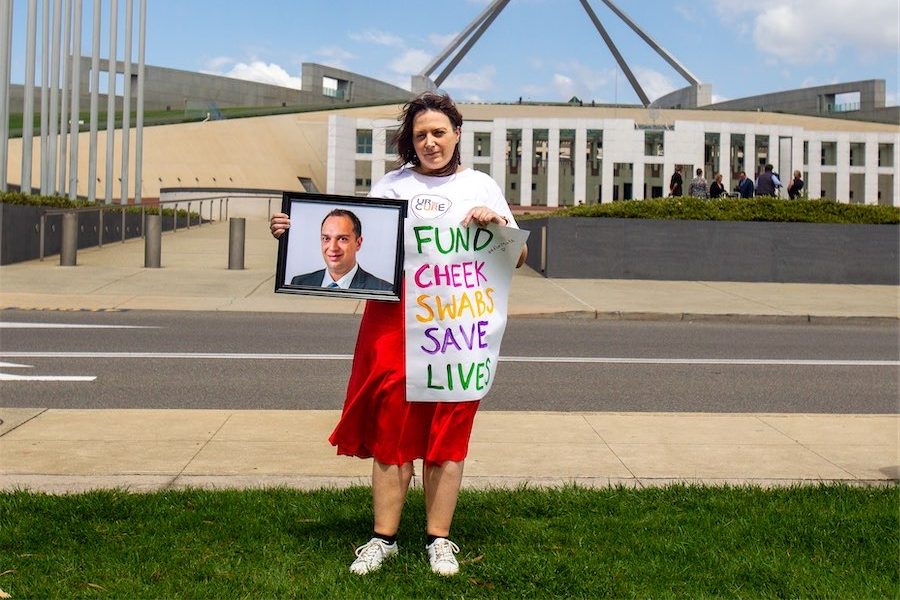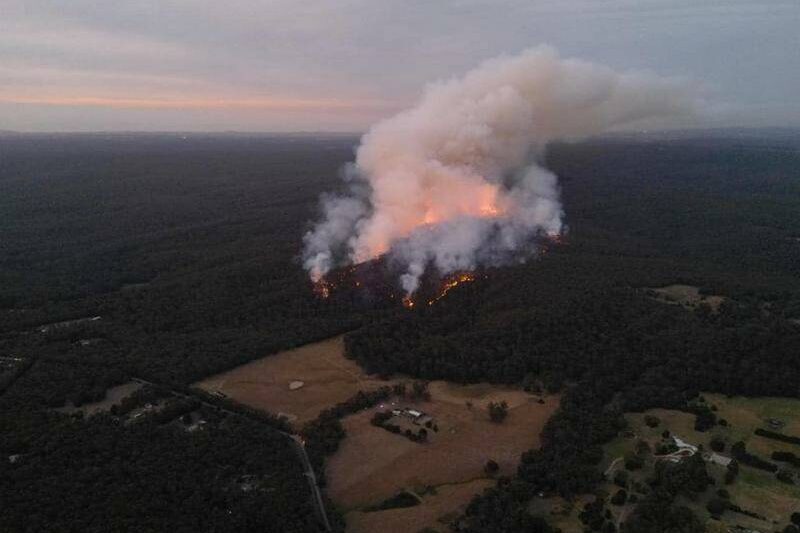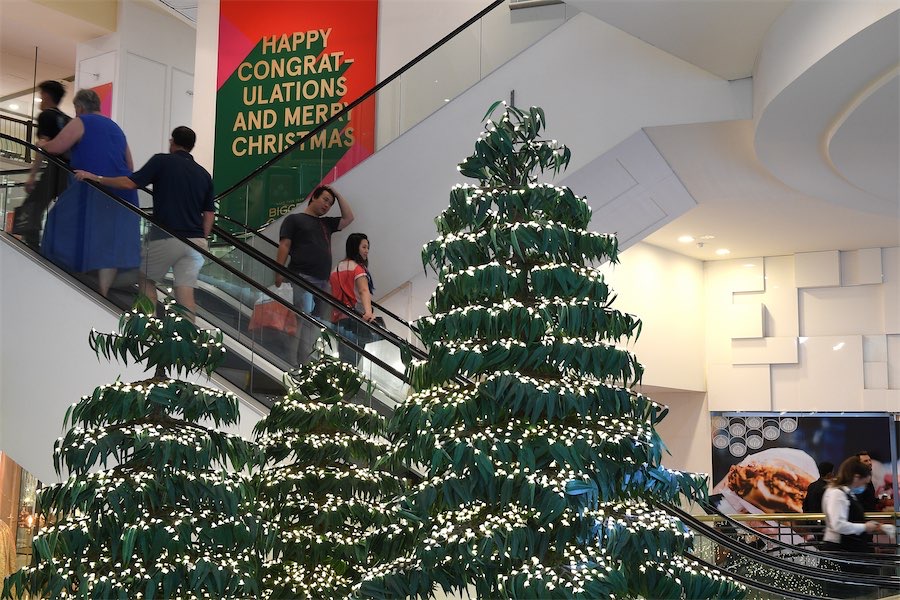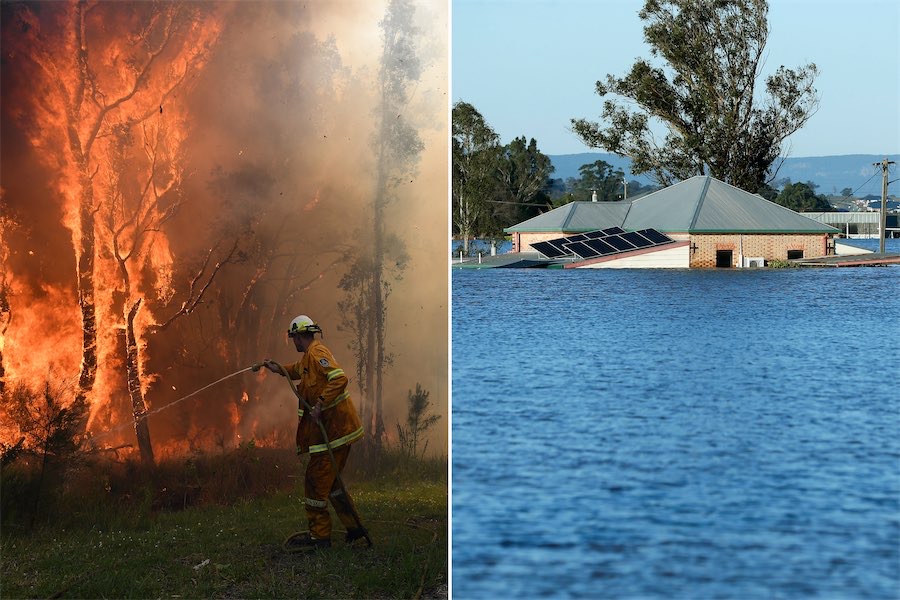
Standing on the front lawn at Parliament House is Tahlee Bearham and her friend Janine Haskins.
They are armed with a few posters and a framed photo of Tahlee’s brother, Matt Saliba, who died in April 2021 after a two-year battle with leukemia.
Tahlee and Janine are trying to raise awareness about the Australian blood stem cell donor registry and encourage government funding for a cheek-swab program organised by Strength To Give. A faster discovery of a stem cell match for Matt may have seen him survive.
“It was November 2019 and I was at work, when I noticed several missed calls and text messages from my brother and his wife,” says Tahlee.
“I called as soon as I had the chance, and my brother very gently broke the news to me. ‘I have leukemia,’ he said.
“Matt began chemotherapy and he wasn’t able to tolerate it. It affected his heart. He was put into intensive care.
“Matt’s doctor sent me for blood-match testing straight away.
“As they took my blood, I remember thinking to myself ‘there is a lot riding on this test.’
“Only one out of four full siblings will be a stem cell match. I am Matt’s only sibling. I hoped and prayed that I would be a 100 per cent match for him.
“I believe that it was Matt who broke the news. They couldn’t use me, I was only a 50 per cent match for him.
“But he told me not to worry, he explained that there is a blood stem cell donor registry in Australia and his doctors were trying to find a match for him there.
“I was relieved and thought that surely, out of the whole of Australia, there would be a match for Matt.
“There was no match.”
The Leukemia Foundation says that in Australia, more than 50 Australians are diagnosed with blood cancer every day.
For many, a blood stem cell transplant from a complete stranger is their only hope, says Tahlee.
“We desperately need more people to sign up, and we need more donors of different ethnic backgrounds,” she says.
According to UR The Cure, Australians of mixed ethnicity have an added difficulty in finding a match within the already limited Australian registry because of the lack of ethnic diversity within the donor pool.
Tahlee attributes this to the lack of awareness.
“I didn’t even know about the blood stem cell donor registry until my brother was diagnosed. I had never heard of it and most people I have spoken to are the same,” says Tahlee.
“I wish that the government would put ads on TV and advertise it so that people know about it the same way they know about blood donation.
“I feel that Aussies are quite generous people, and people want to help a mate, even if it’s a mate they don’t know, so I feel if people knew about it, they would register.”
Tahle says that she was surprised at how easy the process of donating blood cells was.
“It’s a very safe process, when I first was asked if I would be my brother’s stem cell donor, I thought it would be drilling into my hip or something scary like that, and of course I said yes, but then I found out it’s just like giving blood,” she says.
“Once there is a donor match, and everything seems good to go ahead with the donation, the donor just has to administer some small injections, which I’m told are painless, into their stomach for a few days before the donation and that will increase the stem cells in their body.
“Then, they will go to where they’re making the donation and it’s very similar to giving blood, it just takes a little bit longer.
“The stem cells will be filtered from the blood and collected, and the blood returned to their body.
“If you are 18-35 years old, please register with Strength to Give. You can register online, and they’ll send you out a free cheek swab.
“You collect a sample from the inside of your mouth, send it back to them free of charge and you’re registered. You could save a life.”
Tahlee says that the registry is in particular need for 18-35 year old males of mixed ethnicity to register, as males usually have more stem cells meaning they are able to donate more.
Register to be a stem-cell donor at strengthtogive.org.au or urthecure.com.au
Who can be trusted?
In a world of spin and confusion, there’s never been a more important time to support independent journalism in Canberra.
If you trust our work online and want to enforce the power of independent voices, I invite you to make a small contribution.
Every dollar of support is invested back into our journalism to help keep citynews.com.au strong and free.
Thank you,
Ian Meikle, editor




Leave a Reply